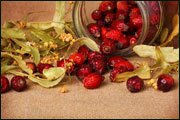Herb Tea

There is a distinct difference between Herb Tea and Chinese Herb Tea. Herb Tea encompasses many different teas made from herbal ingredients while Chinese Herb Tea is specifically made from Chinese Medicinal Herbs in Guangdong, China. Chinese Herbal Tea is bitter and dark. Chinese Herb Tea may be referred to as tea, but actually, it doesn't contain any tea plant properties and is of a soup consistency.
Herb Teas are made from other plants, not the actual tea plant. They could come from fresh or dried flowers, leaves, seeds or roots. Herb Teas should not be confused with flavored teas, which use flowers and other herbs to flavor and add aroma to black, green, white, oolong and other actual tea plant bases. Herb Teas were originated in China and the Middle East but are now enjoyed all over the world. Known for their cooling properties, health benefits, nice flavors and aroma's, Herb Teas are now available in almost every retailer world-wide.
There are many different varieties of Herb Tea with a wide range of health benefits. Anise Herb Tea which is known for relieving conditions such as nervous asthenia, migraines, vertigos, rheumatism, cough, bronchial asthma, gastric pains, and slow digestion. Artichoke Herb Tea is known for helping with cardio-vascular, liver, kidney disorders, eczemas, diabetes, hemorrhoids and for regenerating hepatic cells. Additionally, it helps to relieve constipation without irritating the liver. Roasted Barley Herb Tea helps to cleanse the body and reduce stress.
The Herb Tea Bee Balm is known for the relief of nausea, digestive problems, upset stomachs, vomiting, colds, flu, coughing, antiseptic and decongestant properties, nasal congestion, tight chest, sinus clearing and drying up mucus. Whilst Baldo Herb Tea is used for calming upset stomachs. Cannabis Tea, used to make Bhang, is known as a natural pain reliever. Cinnamon Tea is known to be able to slow the growth of leukemia and lymphoma cancer cells, a regulatory effect on blood sugar, heal yeast infections, anti-clotting properties, lower cholesterol, decreases arthritis pain, and is a plentiful source of manganese, fiber, iron and calcium.
Catnip Herb Tea which acts as a relaxant, sedative and is used to calm. Cerasse Herb Tea, which is unique to Jamaica, is used to rid the body of toxins and is known to clear up acne, reduce hair loss and aid in weight loss. Chamomile Tea is used as a sedative and regularly given to children. Chrysanthemum Tea is used to treat influenza, detoxifies the body, treats heatstroke, sinus congestion, high blood pressure and can calm the nerves. It is also notable that Chrysanthemum Tea can also increase vision and hearing while de-cluttering the brain.
Citrus Peel Teas are being heavily studied and includes many health benefits for both cancers and cardiovascular health. Dandelion Coffee also falls under the Herb Tea category and is known to prevent and cure liver diseases such as hepatitis and jaundice, blood purification, dissolve kidney stones, improve gastro-intestinal health, assist in weight loss, treat skin infections and acne, relieves constipation and diarrhea, prevent and lower high blood pressure, prevent or cure anemia, lower the serum cholesterol by half, prevent and cure a variety of cancers, prevent and control diabetes. Dill Tea is commonly used to treat an upset stomach, Echinacea Herb Tea is associated with preventing and curing cold and flu symptoms.
Fennel is a good relief for vision problems and assists in weight loss. Hawthorne is recognized for reducing the bloodstreams fatty levels. Kava Root Herb Tea aids in relaxation and is said to promote talkativeness. Kuding is used to thin the blood and reduce high blood pressure. Mate de Coca is used for pain relief though is illegal where cocaine is banned. Some retailers may sell this tea, claiming that the cocaine has been removed. Mountain Tea, is a Herb Tea that is considered a cure all but is more commonly used to treat cold symptoms. Rosemary is used to promote better memory while Serendib is used for it's anti-diabetic problems and finally, Thyme is used as an antiseptic and is an ingredient in Listerine.
Other types of Herb Tea include Che Dang, Essiac, Gentian, Ginger Root, Ginseng, Hibiscus, Honeybush, Horehound, Hydrangea, Jiaogulan, Kapor, Labrador, Lapacho, Lemon Balm, Lemon Grass, Licorice Root, Lime Blossom, Lotus Flower, Mate, Mint and Peppermint, European Mistletoe, Neem Leaf, Nettle Leaf, Oksusu Cha, Pennywort Leaf, Red Raspberry Leaf, Scorched Rice, Rooibos, Rose Hip, Roselle Petal, Sage, Sassafras, Skullcap, Sobacha, Spicebush, Staghorn Sumac, Stevia, Sugarcane, Tulsi, Uncaria Tomentosa, Verbena, Vetiyer, Roasted Wheat, Wax Gourd, Wong Logat, Woodruff, Yarrow, Yerba Mate and Yuen Kut Lam Kam Wo.
It is important to remember that some types of Herb Tea, while medicinal in nature, can be toxic or produce allergic reactions. Also, many times the plant that herbs come from can be confused with a toxic look alike. In the U.S. herbal tea manufacturers can not make unsubstantiated claims though these herbal remedies may be in use in other countries like China, and used in place of western medicine. Before you think about using an Herb Tea regularly or for treatment, it is advisable to do some research. Many Herb Teas are very difficult to find in the U.S. as the plants that they derive from is natively grown in small areas around the world.
Disclaimer: The information contained on this site is not intended to replace the diagnosis, treatment, consultation and services of a qualified Medical Practitioner. All information presented is in summary form and intended only for informational purposes. Always seek immediate medical attention for any illness you may have and never disregard the advice from qualified Medical Practitioners as something you have read on this site (or related sites) could be misinterpreted.

